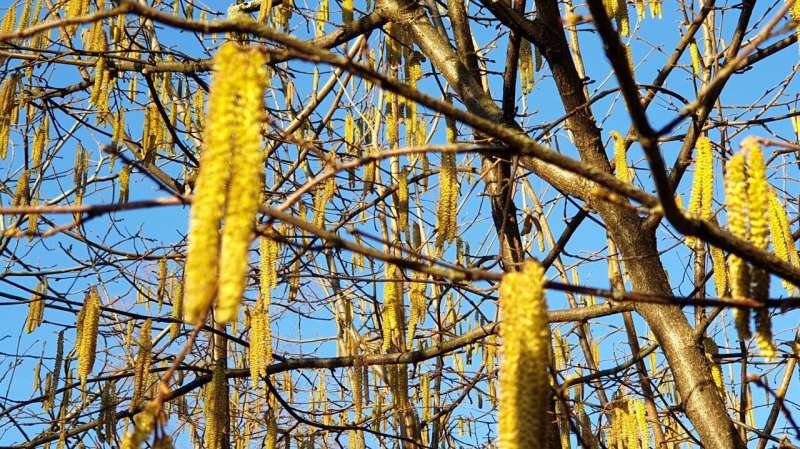Pollen season in Switzerland earlier and more intense due to climate change

Pollen from trees, grasses and weeds are causing seasonal allergies for approximately one fifth of the Swiss population every year. A study now found that due to climate change, the pollen season has shifted substantially over the past 30 years in onset, duration and intensity. "For at least four allergenic species, the tree pollen season now starts earlier than 30 years ago—sometimes even before January," said Marloes Eeftens, Principal Investigator and Group Leader at Swiss TPH. "The duration and intensity of the pollen season have also increased for several species, meaning that allergic people not only suffer for a longer period of time but also react stronger to these higher concentrations."
The researchers analyzed pollen data from 1990 to 2020 from all 14 pollen-monitoring stations in Switzerland, studying airborne pollen concentrations from 12 different plant species. "Previous studies have looked at single species or only a few locations, but this is the first time a study brings together comprehensive pollen data from across Switzerland," said Sarah Glick, first author of the study and scientific assistant at Swiss TPH.
Health impact beyond sneezing
Pollen allergies are the most common chronic disease in many European and North American countries. Today, an estimated 20% of the Swiss population suffers from pollen allergies, a dramatic increase from 100 years ago when less than 1% was affected. This increase is most likely related to changes in our environment, such as personal hygiene and increase in urban rather than rural living. Besides the typical itching eyes and nose and frequent sneezing, pollen allergies can also cause inflammation in the lungs, and result in negative impact on the cardiovascular system, decreased quality of life, and reduced school and work performance.
"Similar to man-made air pollutants like particulate matter or nitrogen dioxide, pollen may actually have numerous negative effects on our body much beyond just nuisance," explained Eeftens. "Given the extent of the population affected and the increasing burden, it is key that we further study the health effects of pollen both acute and more long-term." Swiss TPH just launched the EPOCHAL study to deepen the understanding of the multiple effects of pollen on health including blood pressure, lung function, ability to concentrate, mood and sleep.
"There is little we can do to prevent pollen release from plants, but we hope that the results of the study can help allergic people manage their allergies better," said to Eeftens. "A better understanding of allergenic species could also help guide urban planners in identifying suitable plants for parks. For example, we may think twice before planting highly allergenic trees like hazel and birch in densely populated areas."
More information: Sarah Glick et al, Multi-decade changes in pollen season onset, duration, and intensity: A concern for public health?, Science of The Total Environment (2021). DOI: 10.1016/j.scitotenv.2021.146382
Journal information: Science of the Total Environment
Provided by Swiss Tropical and Public Health Institute




















